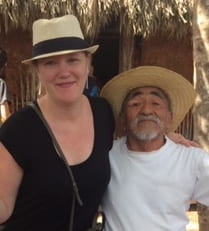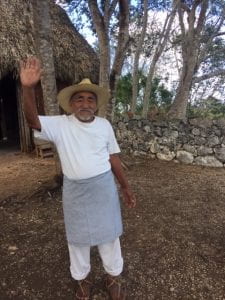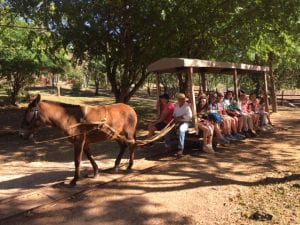One of our field trips will take us to the historic Hacienda Sotuta de Peón, which has been transformed from a dilapidated series of structures into a beautifully restored country house, factory, and living museum that tells the story of Merida’s history. Here we will learn about the turn of the century process used to turn henequen (agave plants) into rope and sand bags, some of the most sought after resources during World War I. The henequen boom at the turn of the twentieth century brought great wealth and great suffering to this corner of the Yucatán Peninsula, when many Mayan people were exploited by the owners of haciendas in the area.

Dr. Ellis-Lai with Don Antonio, who has worked at the hacienda since he was a young man.

Don Antonio greets guests at a replica of a traditional Mayan house.

We will board carriages and ride the historic rails used a century ago to bring carts filled with harvested henequen from the hacienda’s vast fields to be processed at factory near the front of the property.

At the end of the rails, our carriages will drop us off above one of the hacienda’s several cenotes, where will will descend into a partial cave to enjoy the deliciously cool and refreshing water. Life vests are available for non-swimmers, and there are many shallow areas for sitting and relaxing in the water. Folks who are comfortable swimmers will enjoy playing in the deeper areas and floating on their backs to enjoy the play of light refracting off the cave ceilings. If you prefer, you can stay above ground to enjoy a cold drink on a hammock in a shaded pavilion.